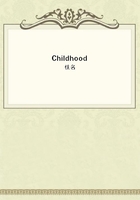
第8章
The man who now entered the room was about fifty years old, with a pale, attenuated face pitted with smallpox, long grey hair, and a scanty beard of a reddish hue. Likewise he was so tall that, on coming through the doorway, he was forced not only to bend his head, but to incline his whole body forward. He was dressed in a sort of smock that was much torn, and held in his hand a stout staff. As he entered he smote this staff upon the floor, and, contracting his brows and opening his mouth to its fullest extent, laughed in a dreadful, unnatural way. He had lost the sight of one eye, and its colourless pupil kept rolling about and imparting to his hideous face an even more repellent expression than it otherwise bore.
"Hullo, you are caught!" he exclaimed as he ran to Woloda with little short steps and, seizing him round the head, looked at it searchingly. Next he left him, went to the table, and, with a perfectly serious expression on his face, began to blow under the oil-cloth, and to make the sign of the cross over it, "O-oh, what a pity! O-oh, how it hurts! They are angry! They fly from me!" he exclaimed in a tearful choking voice as he glared at Woloda and wiped away the streaming tears with his sleeve, His voice was harsh and rough, all his movements hysterical and spasmodic, and his words devoid of sense or connection (for he used no conjunctions). Yet the tone of that voice was so heartrending, and his yellow, deformed face at times so sincere and pitiful in its expression, that, as one listened to him, it was impossible to repress a mingled sensation of pity, grief, and fear.
This was the idiot Grisha. Whence he had come, or who were his parents, or what had induced him to choose the strange life which he led, no one ever knew. All that I myself knew was that from his fifteenth year upwards he had been known as an imbecile who went barefooted both in winter and summer, visited convents, gave little images to any one who cared to take them, and spoke meaningless words which some people took for prophecies; that nobody remembered him as being different; that at, rate intervals he used to call at Grandmamma's house; and that by some people he was said to be the outcast son of rich parents and a pure, saintly soul, while others averred that he was a mere peasant and an idler.
At last the punctual and wished-for Foka arrived, and we went downstairs. Grisha followed us sobbing and continuing to talk nonsense, and knocking his staff on each step of the staircase.
When we entered the drawing-room we found Papa and Mamma walking up and down there, with their hands clasped in each other's, and talking in low tones. Maria Ivanovna was sitting bolt upright in an arm-chair placed at tight angles to the sofa, and giving some sort of a lesson to the two girls sitting beside her. When Karl Ivanitch entered the room she looked at him for a moment, and then turned her eyes away with an expression which seemed to say, "You are beneath my notice, Karl Ivanitch." It was easy to see from the girls' eyes that they had important news to communicate to us as soon as an opportunity occurred (for to leave their seats and approach us first was contrary to Mimi's rules). It was for us to go to her and say, "Bon jour, Mimi," and then make her a low bow; after which we should possibly be permitted to enter into conversation with the girls.
What an intolerable creature that Mimi was! One could hardly say a word in her presence without being found fault with. Also whenever we wanted to speak in Russian, she would say, "Parlez, donc, francais," as though on purpose to annoy us, while, if there was any particularly nice dish at luncheon which we wished to enjoy in peace, she would keep on ejaculating, "Mangez, donc, avec du pain!" or, "Comment est-ce que vous tenez votre fourchette?" "What has SHE got to do with us?" I used to think to myself. "Let her teach the girls. WE have our Karl Ivanitch."
I shared to the full his dislike of "certain people."